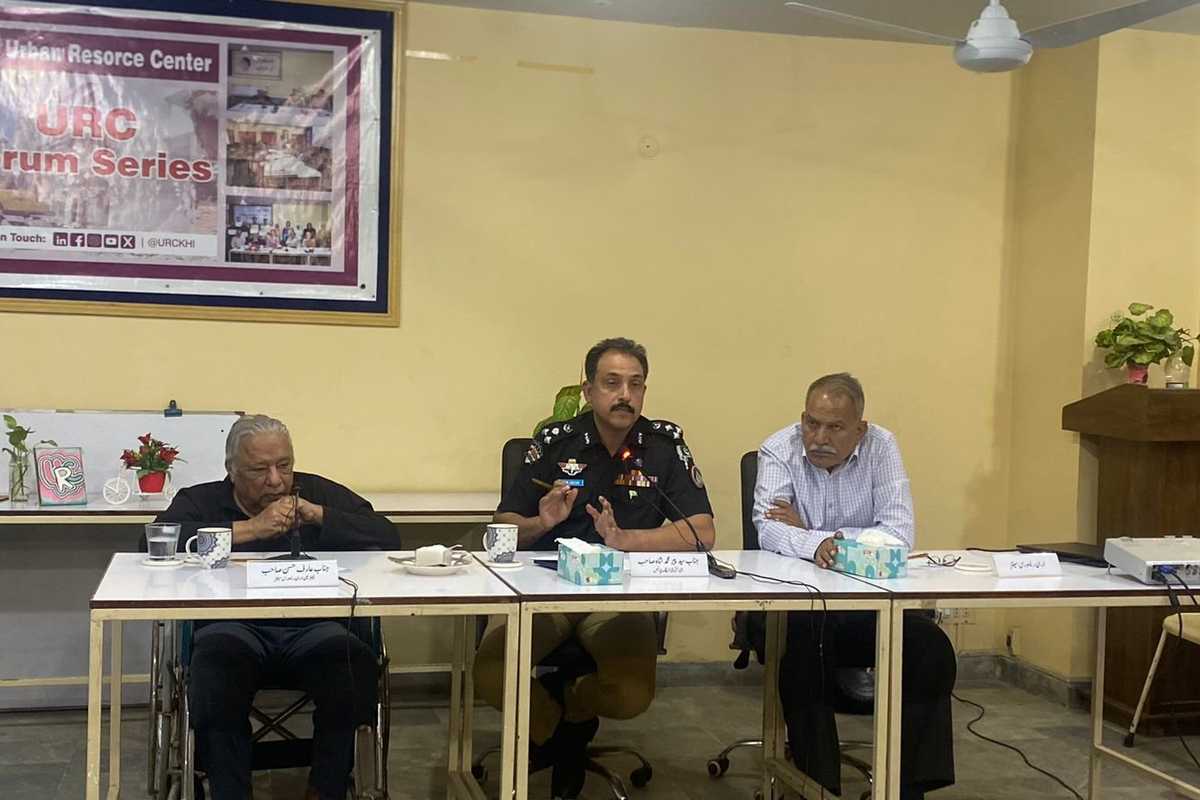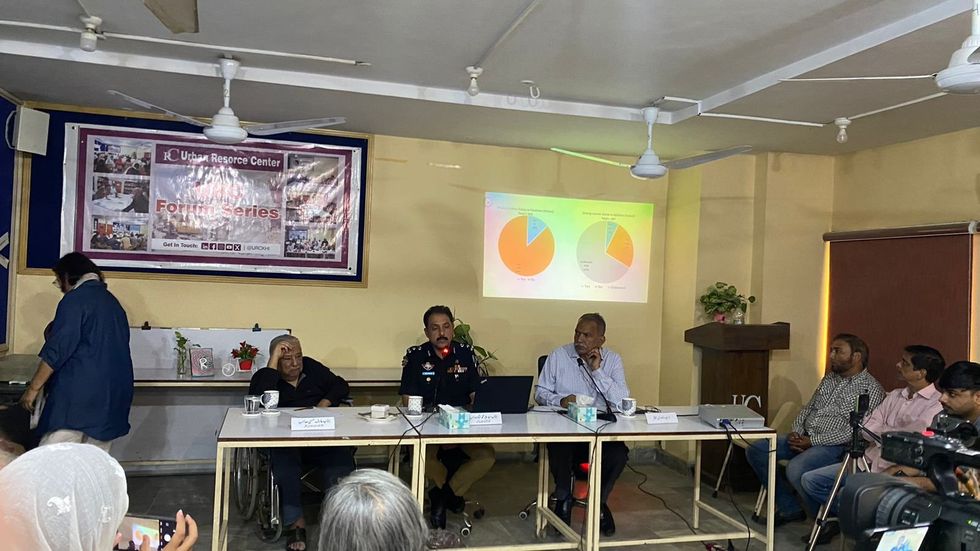Traffic police to go 'faceless' as Pakistan's largest city pushes automation
Karachi to introduce e-ticket system, bar manual tickets, and expand camera network to 12,000.
Razi Wani
Producer - News Desk
Razi Ud Din Ahmed Wani is a multimedia journalist and digital storyteller with a strong background in fact-checking, South Asian politics, documentary filmmaking, scriptwriting, and digital content production. With an MA in Mass Communication from the University of Karachi, he has experience directing and scripting web series and socio-political satires. And has worked across various media and digital platforms, focusing on emerging trends and storytelling formats.

DIG Traffic Syed Pir Muhammad Shah and urban planner Arif Hasan in discussion at the Urban Resource Centre during a public session on Karachi’s traffic reforms and road safety challenges, October 7, 2025
Nukta
Karachi traffic police have officially banned manual challans
Karachi has 7 million vehicles, but only 5,000 traffic personnel to manage them
Only 1,000 surveillance cameras are currently active; 12,000 more are planned
Urban planner Arif Hasan called for a 10-year continuity plan and public participation in traffic reforms
Pakistan's largest city Karachi is moving toward a digital transformation of its road networks. But is it ready?
In a landmark shift toward automated traffic enforcement, the city has officially banned manual ticketing and launched an e-ticket system powered by surveillance cameras and digital records.
The move aims to eliminate human interaction in traffic policing and address widespread violations, but it also raises pressing questions about whether the city’s infrastructure can support such a high-tech transition.
That question was front and center at a public forum hosted on Tuesday by Urban Resource Centre, a Karachi-based think tank, where Syed Pir Muhammad Shah, the city's Traffic Police head, defended the overhaul as a necessary step forward despite glaring gaps.
Foremost among those is the fact that only 1,000 surveillance cameras currently operate in a city of over seven million vehicles.
‘It’s a humongous task’
“It’s a humongous task. By no means is it an easy one,” said Shah, candidly acknowledging the structural challenges.
With only 5,000 traffic personnel, law enforcement has become untenable without technology.
“The real solution is automation,” he said. “Worldwide, traffic systems are faceless. The more you allow police to interact with people, the more unpopular they become.”
Under the new regulations, from Oct. 1, no officer is allowed to stop vehicles or issue manual tickets.
Instead, violations will be detected via cameras, with tickets sent to vehicle owners through the mail and remaining on record until a valid driver’s license is uploaded.
“This will save time and reduce congestion,” Shah said. “It will take time for people to adjust, but the first step has been taken.”
‘Three deaths per day’
He added that when he joined the traffic police, he received numerous complaints and messages about the department’s conduct.
“Not all traffic police are corrupt. There are good officers too, but people lose their temper,” he said. “One of our key tasks was to improve the behavior of traffic police.”
Statistics paint a bleak picture of Karachi’s road safety: three deaths per day, with 40 percent of fatal accidents involving trailers, dumpers and tankers, Shah said.
Only 12 percent of drivers involved in accidents had valid licenses, he added.
Most of the deceased were men, while women were often killed while crossing roads.

Cameras now, questions later
But the system’s success depends on surveillance coverage, and that’s where the infrastructure gap is hard to ignore.
Currently, only 1,000 cameras are operational across the city. The government plans to install 12,000 more, but there is no firm timeline.
When asked how the e-ticket system would function in areas without cameras, Shah admitted the expansion would be gradual.
“Till that time, it’s time for people to learn — don’t do violations, be responsible.”
A new mobile app will allow citizens to check for violations using their national identity card number, with a system of one ticket per month before escalating to warnings — a model Shah claims mirrors international standards.
The reform doesn’t stop at cameras. A separate initiative requires heavy transport vehicles and minibuses to install GPS trackers, with a non-compliance fine of Rs100,000.
‘The problem is systemic’
Urban planner Arif Hasan stressed that without long-term continuity and public involvement, no reform will stick.
“There is a dire need for consistency,” he said. “Give it 10 years, and you will see a difference.”
“If people don’t understand or feel comfortable, the initiative fails,” he warned.
Toward a traffic management company
To sustain the reforms, Shah proposed creating a Traffic Management Company that would reinvest fine revenues into road infrastructure, signage, and signal automation.
He believes two years of focused work could yield visible results.
He also addressed complaints about bribery and low morale among traffic personnel, noting that the department now provides pick and drop services, meals, and bonuses to support its officers.
Shah clarified that vehicles without number plates fall under the Safe City Authority, and such cases will be treated as criminal offenses.
Traffic police will continue issuing e-tickets, while untraceable vehicles will be seized.







Comments
See what people are discussing